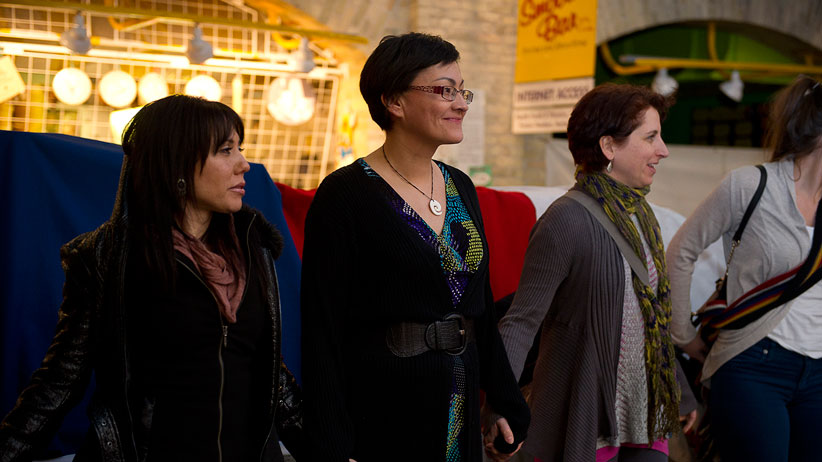Dinner and conversation—in the name of ending racism
In quick-moving groups, Winnipeggers met each other, talked, strategized, and then vowed to change
Rosanna Deerchild (centre) organized an event in which around 80 people joined together at the Forks in Winnipeg Monday February 16, 2015 to discuss the issue of racism. The event featured dinner and discussion.
Share

This week, a group of about 80 Winnipeggers gathered for dinner downtown at The Forks, the sacred historic meeting ground for Aboriginals, where the Red and Assiniboine Rivers meet. The topic of conversation: How to address the city’s long-standing, long-ignored racism problem. Elder Geri Shingoose began with a blessing as the room was smudged. “I never thought I’d see this day,” Shingoose said later. “Our ancestors would be so happy.”
The event was organized by broadcaster Rosanna Deerchild, the woman pictured on a recent Maclean’s cover about Winnipeg’s appalling treatment of Aboriginals. The article prompted Mayor Brian Bowman to announce a year-long project meant to tackle the city’s racism problem. Deerchild says her event will launch a series of citywide dinners aimed at moving the dialogue on racism into action.
Related:
Welcome to Winnipeg, where Canada’s race problem is at its worst
Canada’s race problem is worse than America’s
The diverse crowd of invited guests included children as young as eight, new immigrants and well-known Winnipeggers such as MLA Kevin Chief, charity worker Althea Guiboche, architect Sasa Radulovic, youth leader Michael Champagne, activist Leah Gazan, and broadcaster Terry MacLeod, the former long-time host of CBC Manitoba’s morning show, Information Radio.
Participants were divided into groups of six to eight and, every 20 minutes, they shuffled tables. After dinner (donated by restaurants at The Forks), conversations turned toward solutions: how to better educate city youth about indigenous history, how to bring more indigenous art into city institutions, how to break barriers and draw people outside their silos.
Mary Beth Taylor, one of the attendees, called the Maclean’s article “a gift wrapped in barbed wire.” Moderator Heather Plett said she and some others felt punched in the gut when that article came out. “But we didn’t sit at home in our pain; we let our pain direct us,” she said. Instead of “denial and deflection, our community took the extraordinary step of acknowledging the problem and vowing to confront it head-on,” said Deerchild. “Conversations, debates and actions about race and racism that have never happened before” are happening now.
Related:
In Winnipeg, a meaningful stand against racism
Paul Wells: Winnipeg rises to a challenge
This week, for instance, the city’s downtown university took a big step toward combatting racism on campus. The University of Winnipeg Students’ Association (UWSA) is proposing a mandatory indigenous course for all undergraduates starting next fall (the same way some universities require undergraduates to take one class in math or literature). If the proposal gains approval at the university’s senate next month, all undergraduates would be required to choose from roughly 100 courses, everything from Iroquois history to a class on sacred traditions. It would be the first requirement of its kind in Canada.
“We’ve got a tough history in Winnipeg. There’s a lot we need to take account of, and be aware of,” says UWSA president Rorie McLeod Arnould, 24. Three years ago, he took a course on inner-city issues: “There was this entire side of Winnipeg I didn’t know about,” he says. He said he’d never “choked up” before, the way he did when hearing an Aboriginal participant talk about being beaten by a group of police officers. “Sometimes you need a bit of a push down that road to look outside yourself, at what people around you are experiencing.”
There have been subtle responses to the renewed conversation about race, too. Taylor says it has even affected the way she and her husband parent: “When Mayor Bowman responded to the article by saying he wanted his boys to be as proud of their Metis heritage as of their Ukrainian heritage, we realized we weren’t doing it ourselves,” says Taylor, whose husband has Micmac blood. “We celebrate Robbie Burns day, but we weren’t celebrating that heritage.” They recently began telling their three-year-old son, Daniel: “You are First Nations.”
Interactive: In their own words, Winnipeg leaders discuss a momentous day
Before the event at The Forks finished, the guests stood in a circle to tell the group one thing they planned to do. “Read more Aboriginal writers,” said one. “When someone says: “I’m not racist, but . . .,” I’m going to find the courage to stop them in their tracks,” said another.
Through tears, Deerchild said she felt “oddly optimistic,” as she brought the event to a close. “I’m going to find the courage to get up every day and fight back, till we can all stand shoulder-to-shoulder. We need to keep the momentum going; if it stops, everyone will lose out.”
At that point, Jenna Wirch, one of the city’s best-known indigenous youth leaders, broke down: “I never thought I would have these conversations in my life,” said the 24-year-old, through tears. “I used to feel so ashamed to be brown. I had so much anger and aggression toward society because of it. But I feel it melting away. I’m crying—but not for the same reasons I used to. This conversation has started to make me feel empowered, like we can change society’s views of indigenous people.”